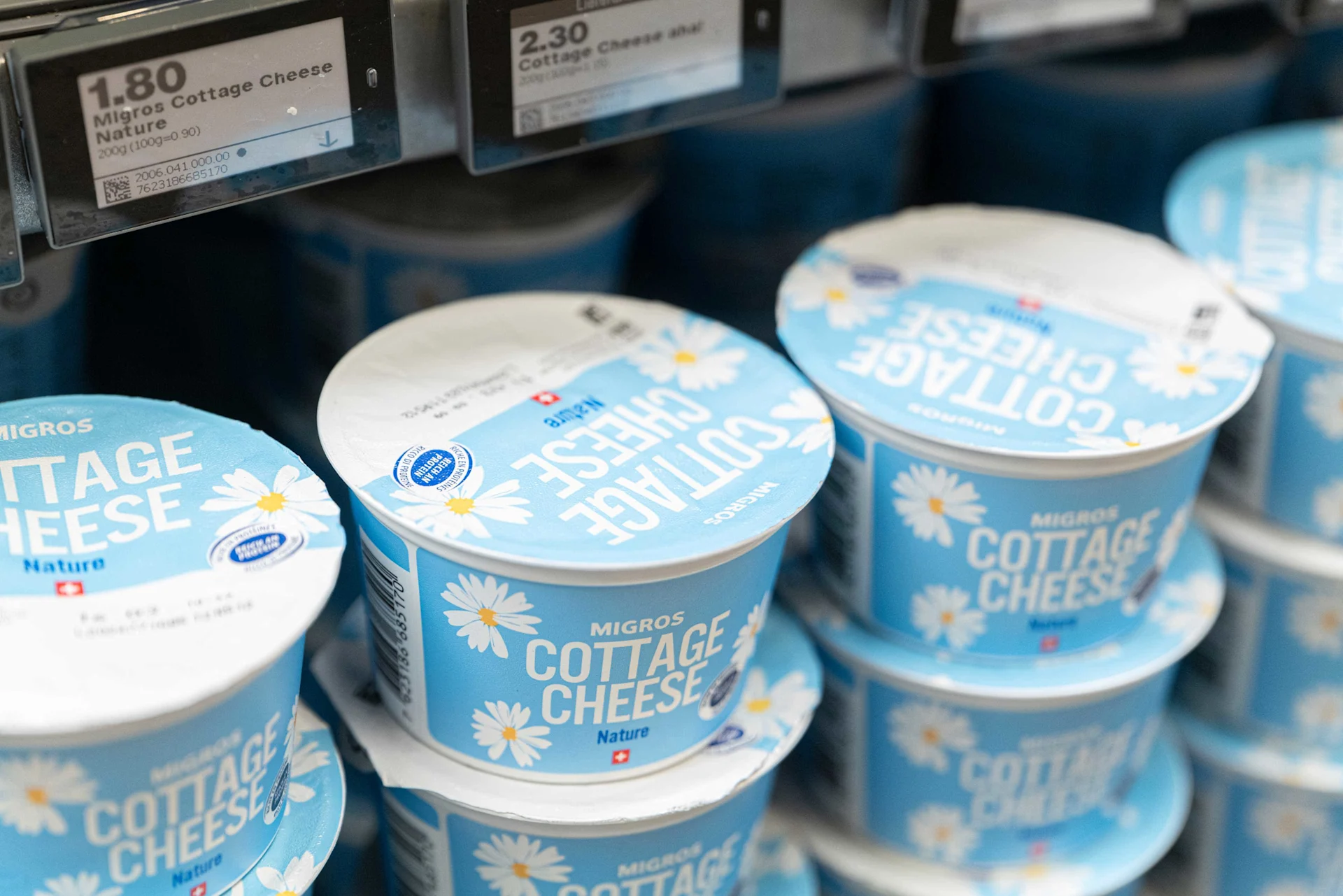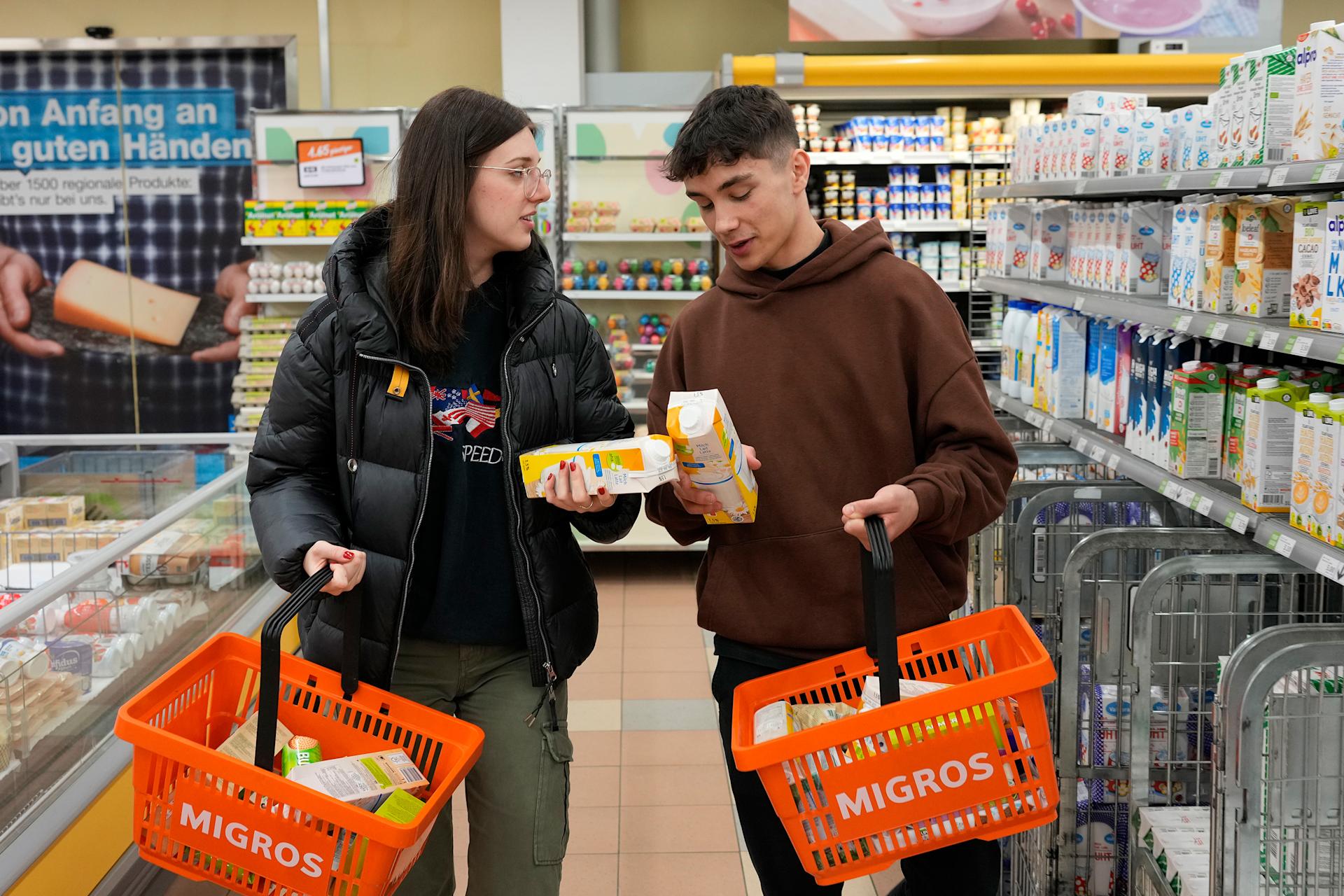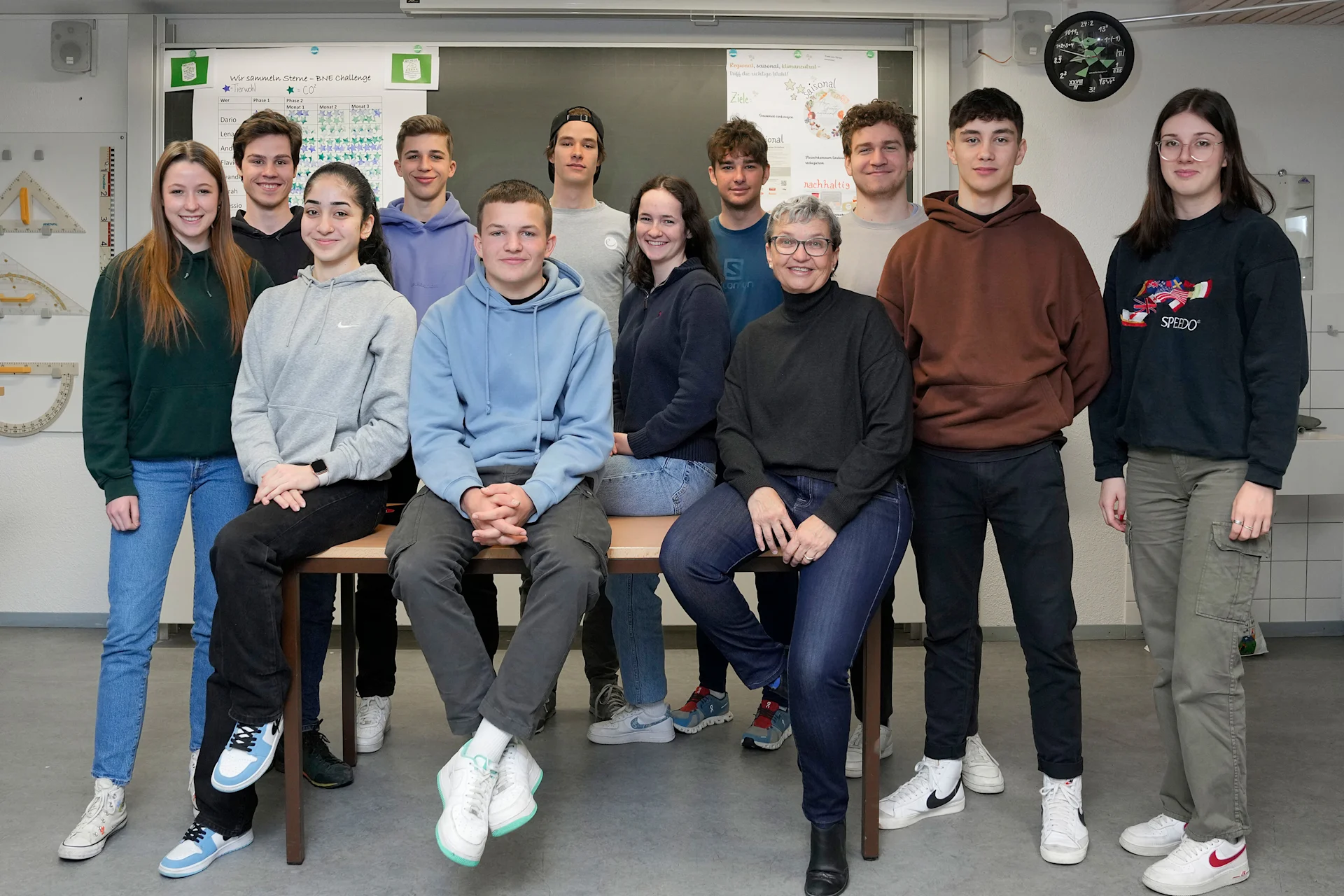
Responsible packaging
Migros is doing all it can to make packaging more sustainable and eco-friendly.
navigation

Sustainability
How can we shop more sustainably? A secondary school class from Liechtenstein is on the search for answers with the help of the M-Check – a system that rates the environmental friendliness of products. Here’s what they had to say.
It’s 7:40 on a Monday morning. The rain is chucking it down as we pull up to a secondary school in Vaduz, Liechtenstein. We have arranged to meet with Elvira Schoch and her 7Ws class. 7 is the final year, W stands for economics and s for sport, meaning we’ve been invited to spend some time with a sports class. We’re here to talk about a project that they’ve been working on for the last four months – a challenge on the topic of sustainable nutrition.
This challenge is part of a larger annual challenge that the whole school is participating in called «Healthy nutrition for people and the environment». The project is rooted in the curriculum. Elvira Schoch had already explained to us that, «one aspect of this project is ‘Sustainable Development Education’ (or BNE for short in German) which covers a range of interdisciplinary topics such as the natural environment and resources as well as health.»
The teacher comes to collect us at the entrance and guides us through a maze of corridors until we reach the classroom. «In the past, this is where monks used to sleep,» she explains. At the time, the monks were forced to flee National Socialism and founded the school in 1937.

The mood in the classroom is very different to the gloomy skies outside. Eleven bright-eyed 18- and almost-18-year-olds are sat in a semi-circle and look towards us eagerly as we enter the room. The first thing you notice is a poster with the title: «Local, seasonal, climate neutral – make the right choice». On the poster, Elvira Schoch and her class have noted down the main focus areas for their challenge: to shop locally and seasonally, to reduce meat consumption and food waste and to collect stars.
Sorry, collect stars? «Yes. I came across the M-Check from Migros which assesses the sustainability of products and rates them using stars. The more stars, the more sustainable the product. The highest number of stars you can get is five,» explains Schoch. Both the class and teacher found this transparent measurement system useful when completing their challenge.
After an induction period, the participants spent three months voluntarily recording their grocery shopping and documenting this using photos, receipts and fridge inventories. When doing so, they took note of how many stars they collected with each purchase. «We focussed particularly on animal welfare and climate compatibility.» In order to draw an assessment, the participants each looked specifically at their top 20 most frequently purchased products. Afterwards, they recorded the number of stars for these products on a poster using stamps. Blue stamps represent animal welfare, whilst green ones are used for climate compatibility. «The stamped stars show the average value for the products. You can see how some people have been able to improve their score from 3 to 4.5 stars.»
Fynn was one participant whose score improved. «As a rookie, the stars really helped me. I didn’t really have much knowledge about the products. The stars meant I could categorise the products more easily,» explains the young volleyball player. What surprised him most was the fact that organic mangos and organic avocados were awarded five-stars for climate friendliness. «I then found out that they were transported by boat. Had they been flown in, they wouldn’t have achieved such a good rating.» However, he only eats mangos occasionally. But he’s happy about their score as they make a nice alternative to local fruit when he fancies a change. Fynn also reduced his meat consumption to no more than twice a week. Before, he was eating meat three to five times each week. «Instead of salami sandwiches, I’m now eating trail mix during my breaks.»
His twin brother, Michel, – who’s in the same class and an equally talented volleyball player – was also able to cut down on meat during the challenge. «It wasn’t easy but I felt better for it. And I still had a lot of energy, which is important when you’re playing sports.» He then explained how the challenge had become something of a family affair. He felt that the challenge made cooking a little more difficult because avoiding meat meant many dishes were no longer an option. «We then turned to different types of rice dishes and ate a lot of vegetables too. Eggs and lentils were also something we used, as well as superfoods like quinoa. You can even find local varieties of these products.» He wants to continue with his new diet even after the challenge. «Although I might be a little less strict with it than I am now.»
Sarah – yet another talented young volleyball player – found making the change easy. «In my family, we’ve always paid attention to whether products are local and organic,» she says. She does eat meat four to five times a week. «But I’m eating much smaller portions of it. For example, I’ll eat a maximum of a quarter of a chicken breast per meal.» This also means that one single chicken breast goes further. And in her family, she says that leftovers don’t hang around for long. Sarah now avoids bananas all year round and only eats raspberries when they’re in season. She can often be found working in the garden with her «Neni» (granddad). «It’s a great way to be sustainable, and also helps save money. I’d really recommend building a raised bed for growing lettuce, cucumbers and tomatoes.» She’s also a fan of the M-Check. «It makes it so much easier to shop sustainably, because it’s not always clear what logos like ‘organic’ actually mean.»
Michelle, who went vegetarian for a month during the challenge and now consumes very little meat, also finds the M-Check useful. «You can tell immediately how sustainable something is. It’s very clear and means I don’t have to make a big effort to find out about the product,» says the swimmer. Her favourite product is the lactose-free milk from aha!. This product has a score of four out of five stars for both climate compatibility and animal welfare. «It’s a breakfast essential for us!»
Dario nods in agreement. It’s the same for him. «I also like the lactose-free cream,» the judoka adds, who still has a slightly bruised eye from his last fight. The challenge made him realise that he eats a very large amount of meat. «I was able to cut this down,» he says. Overall, he was pleasantly surprised by the project. «Going forward, I’ll be making an effort to buy local produce and be more aware of what I’m eating.»
The challenge also made an impact on Elvira Schoch. «It’s not that I compare the number of stars for each product, but when I’m at the shops, I do pay more attention to whether or not products are organic.» As a result, her shopping basket now includes things like organic chamomile tea, organic carrots, organic yoghurt and organic Butterzopf (a type of Swiss bread). «And when it comes to meat, I now opt for chicken rather than veal because this has less of an environmental impact.» She found the challenge very educational. «I’m keen to see what we’ll retain from this challenge going forward!»
On what products can you find the M-Check?
You can find it on all of our own-brand products. These make up around 80% of our product range. So far, we’ve used this system to provide transparent assessments of over 30,000 products. You can find the ratings online on migros.ch. By 2025, we’re aiming to add the M-Check to all our own-brand products in stores too.
Why is M-Check only available for own-brand products?
Since we don’t own the trademark for third-party products, we can’t just print something on other manufacturers’ packaging. With the aim of providing full transparency, however, we would really appreciate it if other manufacturers and producers would also adopt our method for rating products in terms of sustainability.
Is the M-Check just a marketing trick?
No! We work on determining each aspect of sustainability with external partners including the School of Agricultural, Forest and Food Sciences (HAFL) and the LCA companies intep and Carbotech. The sustainability of the packaging used is also verified by the Swiss Federal Laboratories for Materials Science and Technology, Empa. For everything that relates to the climate, we work together with the independent foundation myclimate.
Are there any low-budget M-Check products?
Yes! There’s a variety of M-Budget M-Check products, meaning you can save money and collect stars. These include milk, muesli and pasta.
Discover exciting stories about all aspects of Migros, our commitment and the people behind it. We also provide practical advice for everyday life.